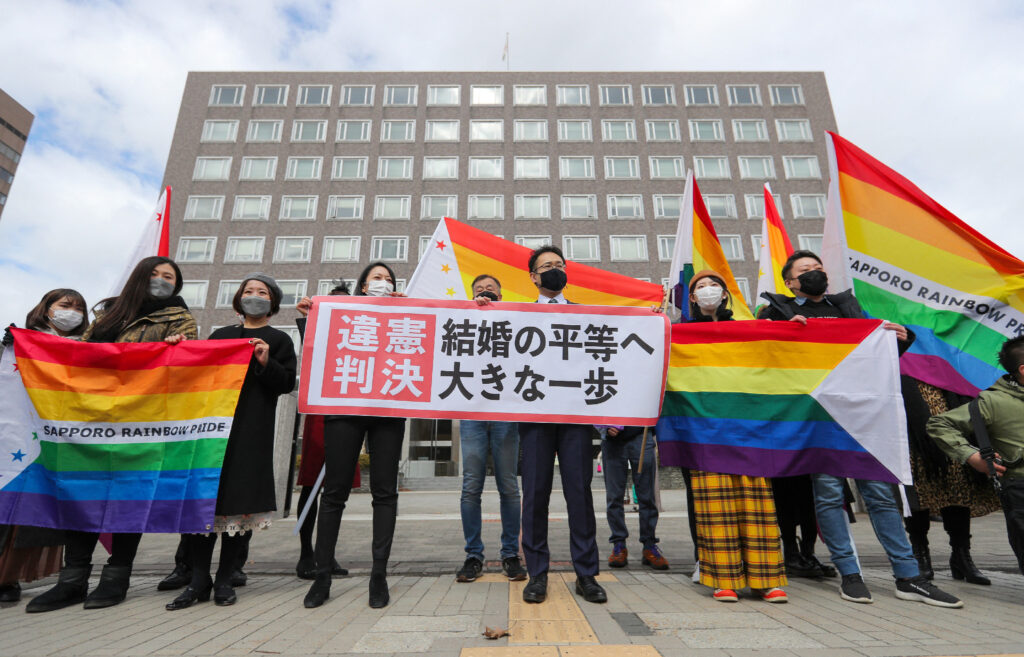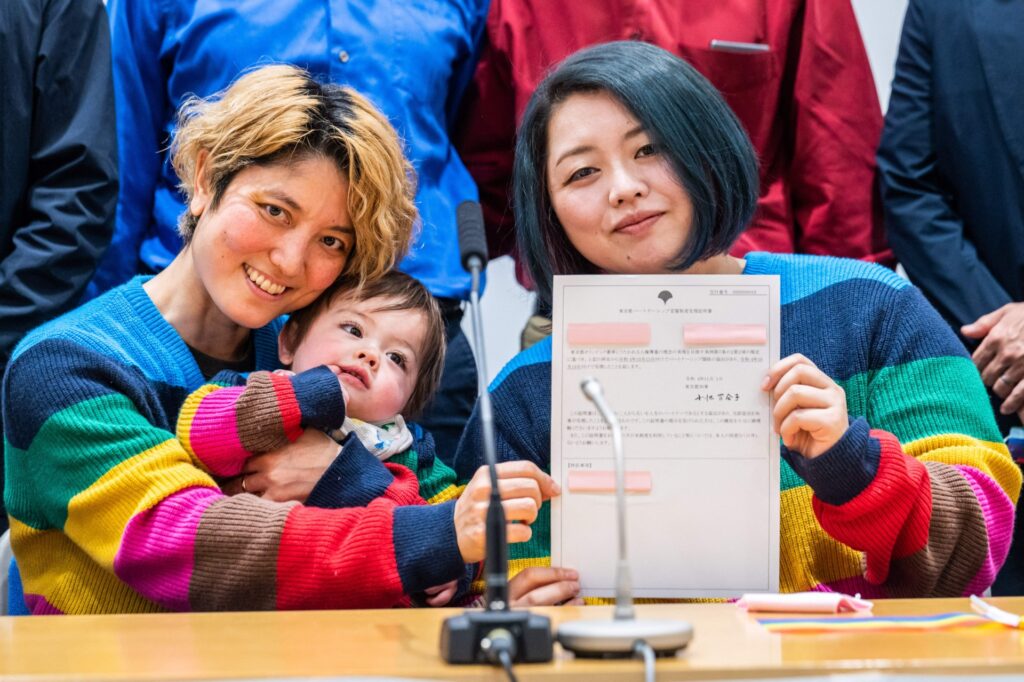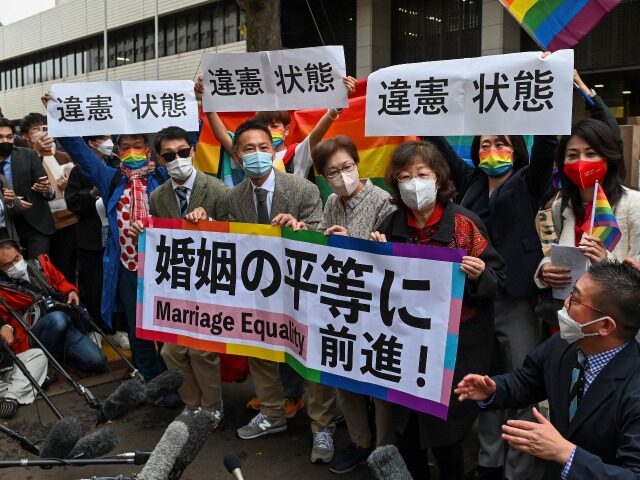Japan’s Nagoya District Court ruled Tuesday that failing to recognize same-sex marriages is unconstitutional, even though the Japanese Constitution currently stipulates that marriage requires a man and a woman.
Gay rights activists hailed the ruling as another step toward forcing the national government to recognize same-sex marriage, following a similar but more limited ruling by the Sapporo District Court in 2021.
The Japanese Constitution has said since 1946 that marriage “shall be based only on the mutual consent of both sexes, and it shall be maintained through mutual cooperation with the equal rights of husband and wife as a basis.”
The precise meaning of this requirement and how it balances against constitutional guarantees of equal protection has become a topic of much legal argument over the past few years.
The Sapporo court ruled in March 2021 that “sexual orientation is not something that a person can choose and change at their own will,” so it was “discriminatory” to deny gay couples “even part of the legal benefits resulting in marriage.”
The ruling implicitly accepted the plaintiffs’ argument that the constitutional definition of marriage mentions “husbands” and “wives” and requires “the mutual consent of both sexes,” but it does not explicitly state that a legally recognized marriage must consist of one man and one woman.
On the other hand, the court denied the request of three same-sex plaintiff couples for financial compensation and said it could not legally compel the Japanese parliament, the Diet, to legalize gay marriage.
The Sapporo court ruled fairly narrowly that banning same-sex marriage violated Article 14 of the Japanese constitution, which states that “all of the people are equal under the law and there shall be no discrimination in political, economic or social relations because of race, creed, sex, social status or family origin.”

Supporters are pleased with the Sapporo District Court’s decision that it is unconstitutional to not allow same-sex marriage in Sapporo, Hokkaido prefecture on March 17, 2021. (Photo by STR/JIJI PRESS/AFP via Getty Images)
Courts in Osaka and Tokyo subsequently ruled last year that banning same-sex marriage is not unconstitutional, although the Tokyo court also said that the lack of a legal framework for same-sex couples was an infringement upon their human rights.
The Nagoya ruling was more expansive than the 2021 Sapporo decision because it stated that banning same-sex marriage violates both Article 14 and Article 24 of the Japanese constitution. Article 24 is the very same article that refers to the “mutual consent of both sexes.” It has a second clause, which states:
With regard to choice of spouse, property rights, inheritance, choice of domicile, divorce and other matters pertaining to marriage and the family, laws shall be enacted from the standpoint of individual dignity and the essential equality of the sexes.
The Nagoya court said this second clause was violated by the ban on gay marriage because it fails to recognize the “essential equality of the sexes,” including various sexual orientations. As with previous rulings favorable to gay marriage, the court stopped short of granting the plaintiffs’ request for financial compensation and did not demand legislative action from the Diet.
The ruling was, nevertheless, celebrated by a crowd of activists waving rainbow flags gathered outside the courtroom.
“This ruling has rescued us from the hurt of last year’s ruling that said there was nothing wrong with the ban, and the hurt of what the government keeps saying,” the plaintiffs’ lawyer Mizutani Yoko told reporters.
Mizutani said she was encouraged that the Nagoya court did not regard civil unions or partnership agreements as adequate substitutes for marriage, an outcome some observers extrapolated from the Tokyo ruling.
The government of Prime Minister Kishida Fumio and his Liberal Democratic Party (LDP) do not support same-sex marriage. Chief Cabinet Secretary Matsuno Hirokazu said on Tuesday that the administration does not believe the Japanese Constitution supports legalizing same-sex marriages, and he noted a sizable portion of the Japanese public remains opposed to the idea.
“With regard to issues surrounding the introduction of same-sex marriage, we believe it is important to pay close attention to the opinions of all parts of the public,” Matsuno said.
Kishida himself has been treading carefully around the issue. In February, he fired his executive secretary Arai Masayoshi for saying that he “would not want to live next door” to a same-sex couple and “does not even want to look at them.”
Arai told reporters during an off-the-record conversation that many Japanese shared his views, and if gay marriage was legalized, “quite a few people would abandon this country.”
Kishida said Arai’s comments were “completely inconsistent with the policy” of his government, which has been “respecting diversity and realizing an inclusive society.”
Kishida’s political coalition sought to placate other members of the Group of Seven economic block (G7) by passing a bill that would promote a greater “understanding” of LGBTQ people before hosting the G7 summit in Hiroshima this month. The bill was delayed and watered down by opposition from within LDP and did not reach the Diet until the day before the G7 summit began.
Opinion polls show that up to 70 percent of the Japanese public favors same-sex marriage, and 278 municipal governments have created limited “partnership agreements” for same-sex couples. However, these partnerships lack some of the legal protections granted to married couples.

Mamiko Moda (L) and her partner Satoko Nagamura, with their son, hold a same-sex partnership certificate after a press conference at the Tokyo Metropolitan Government building on November 1, 2022. (Photo by YUICHI YAMAZAKI/AFP via Getty Images)

COMMENTS
Please let us know if you're having issues with commenting.